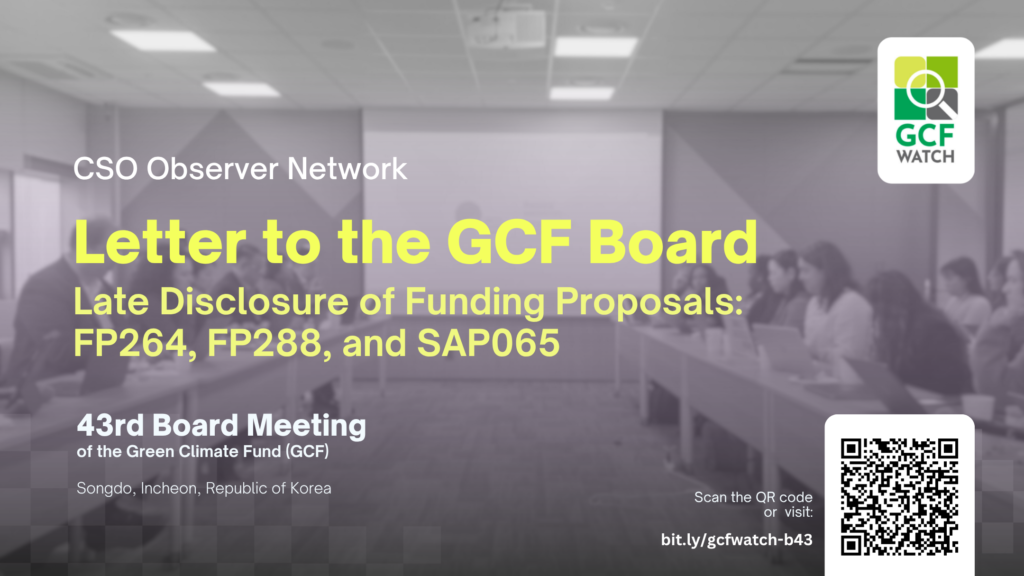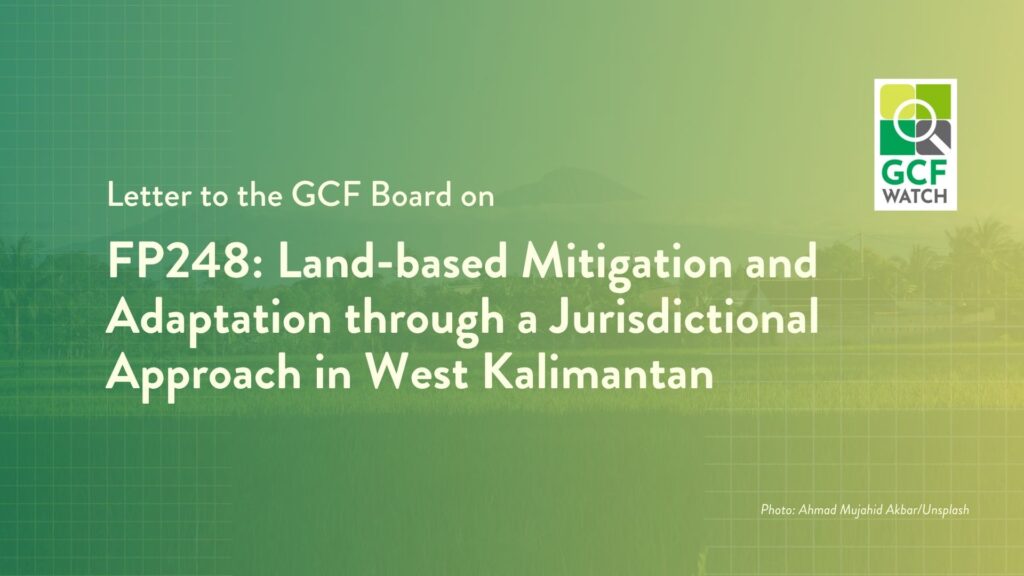CSO Updates on the 30th Board Meeting of the Green Climate Fund – Day 2
 DAY 2 – 5 October 2021
DAY 2 – 5 October 2021
Note: You may also download the document here.
Read the full text of the interventions from the CSO Observer Network here.
Day 2 of the 30th GCF Board Meeting began with Executive Director Glemarec’s presentation on the Secretariat capabilities to deliver the Updated Strategic Plan (USP) for 2020-2023. Given the growing ambitions of the Fund, particularly the funds it plans to commit ($15 billion), implement ($13.1 billion), and disburse ($5.1 billion) by 2023, the Secretariat expects a dramatic increase in workload as well. He also bared that most of the 290 full time employees are facing issues of mass burnout due to significant pressure. According to surveys they have conducted, work-life balance is a top issue among GCF employees. Without additional Secretariat capacity, the Executive Director warned that there will be implications on disbursements, project risk management, response times, and climate results.
The Secretariat also plans to expand and implement further efficiency reforms as part of their 2022 work programme. They estimate that around 437 full time employees (FTEs),accompanied by efficiency reforms, are required to deliver the USP priorities. They proposed two options by which to go about this expansion: (1) via a phased scale up to 350 FTEs by 2023; and (2) via a scale up to 300 in 2022 and a review in 2023 to assess whether the Secretariat needs more expansion. All Board Members welcomed the need for increasing Secretariat capacity and some expressed their concerns over the pressures and issues of the Secretariat staff.
The Executive Director also reported that they have begun to consider and conceptualize plans on establishing regional presence in countries and regions where the GCF operates and provides services. They communicated that setting up liaison offices in specific regions would make work on readiness, project development, and portfolio monitoring more efficient.
BMs for developing countries welcomed this development, arguing that language barriers and time zone differences have since hampered the services and work of the GCF in developing countries, particularly in Latin America and the Caribbean states, LDCs, and the African states. The BM from Albania asserted that regional presence should ease the access of NDAs to the Fund, as well as their collaboration with the Secretariat. Various BMs also expressed the need for the Secretariat to initiate feasibility studies on which regions or countries should be considered by the Board for the establishment of regional presence or liaison offices. The BM from Egypt on the other hand, noted the current geographical imbalance among the staff in the Secretariat and stressed that future staff hiring should reflect and include representatives from regions that the GCF actually serves.
Our CSO intervention delivered by Eileen Cunningham, the Active Observer from developing country CSOs also welcomed the plan to enable the Secretariat to fully perform its suite of obligations thoroughly and effectively, reduce staff turnover, and ensure that staff enjoy a positive work environment and have appropriate work-life balances. However, CSOs asserted that increased staff capacity should enable the GCF to further strengthen, implement, and monitor environmental and social requirements related to safeguards, the Indigenous Peoples Policy, and Gender Policy. The GCF regional presence should also result in deeper engagement with observers, Indigenous Peoples, and local communities and contribute to true country ownership.
Because of pending issues with some of the BMs, the Co-Chair from France instructed the Secretariat to conduct more consultations to iron out the concerns.
This was then followed by the discussion on the Work Programme and Administrative Budget for 2022 of the GCF Secretariat. The GCF Executive Director began his report by baring that both were designed to meet the pace of growth of the GCF and deliver the Board’s ambitions under the USP. The 4 initiatives to achieve the USP, which require increases in budget for building full time employee capacity are:
-
Scaling up programming for DAEs, adaptation projects, and private sector projects and partnerships; employ a data-driven, risk-based approach to managing finances
-
Improving access and effectiveness via business process reform and digitalization; and
-
Preparing for the 2nd replenishment process.
The Secretariat proposed an $87.8 million administrative budget (5.1% increase), $79.4 million Secretariat budget (5.8% increase), $4.8 million Board budget (0.2% increase), and a $3.65 million trustee budget (2.9% decrease).
The proposed Secretariat budget involved an increase in staff costs ($2.8 million increase), anticipating that there will be 250 staff by the third quarter of 2022. They also proposed an increase in budget for consultants ($1.6 million increase) arguing that this is essential to maintain GCF momentum and avoid significant disruption to key functions. The administrative budget on the other hand, plans to increase 66 consultant FTEs and 20 intern FTEs. They also expect consultant costs to decrease as staffing decreases. The Secretariat also proposed budget increases in cost-allocation to Independent Units.
Almost all BMs expressed their support for the Secretariat’s work plan to increase programming in DAEs, adaptation, and private sector. Developed country BMs particularly emphasized their support for increases in private sector programming.
BMs from US, Egypt, Sweden, and the Philippines expressed concern over the increase in budget for consultants, arguing that the augmentation of Secretariat and institutional capacity should translate to less reliance on consultants.
BMs from Egypt, Mauritius, and South Africa also communicated their concern over the lack of ambition for expanding DAE programming, underscoring that the ambition does not reflect the number of DAEs being accredited and having projects. The BM from Egypt proposed to revise the Secretariat’s targets on DAE and how they evaluate ambition with regard to DAE access. He proposed a measuring stick less focused on finance volume to DAEs, and more centered on the number of DAE projects.
Our CSO intervention, delivered by Erika Lennon, Active Observer from developed country CSOs, concurred with the concerns from developing country BMs, arguing that the Secretariat should measure its success on the quality of funding proposals and not merely on the quantity (number of projects, amount of money programmed) as focusing on the latter could lend itself to continued focus on IAEs. Erika further said that the reference in the report explicitly linking the private sector and the Project-Specific Approval Approach (which has yet to be approved) should be focused primarily on improving access for DAEs. Our CSO intervention also supported the focus on enhancing country-drivenness, and stressed that engagement should not merely be between governments/NDAs, AEs, and the GCF, but should include local communities and indigenous peoples as true country ownership is not government ownership, but whole country including local communities, CSOs, IPs, and women.
The Co-Chair then moved to suspend the agenda item to allow further consultation between the Secretariat and concerned BMs over the issue on how to improve ambition on DAE programming.
The Board then proceeded to discuss the Board Decisions proposed between B29 and B30. Thus far, there were 8 decisions presented to be part of in-between meeting decisions (BBMs). Of these, 4 were approved and 4 were objected.
|
BBMs approved |
BBMs objected |
|
|
|
The co-chair from Mexico affirmed that currently, the objections have been upheld despite responses provided by the co-chairs prior to B30. As a way forward, both co-chairs proposed to prioritize the decision on the 10th Report of the GCF to the COP at this Board Meeting, then start the discussion on the Updated Accreditation Framework and address outstanding BBMs as appropriate.
The 10th GCF Report to the COP was circulated to the Board for approval without a Board Meeting, last July 14, 2021. Objections from the African Group and BM from Germany were received by the co-chairs before the set deadline. They immediately conducted consultations with the objecting BMs, and then circulated a revised version of the report, incorporating the views raised. This was followed by comments raised by the BM from the US, and the co-chairs consequently revised the report to include the additional comments. The revised version, which included all objections and comments, was circulated to the Board a few hours before Day 2 of this Board Meeting. So far the changes from the B29 version are the following:
1. The Privileges and Immunities (P&I) annex report has been deleted. Instead, paragraphs to explain the status of bilateral agreements on P&I were added.
2. Text to ensure consistency with the Updated Strategic Plan (USP) has been added
3. Text to ensure consistency with Accredited Entities’ overall portfolio with low carbon emission and climate resilient development pathways were added.
BM from South Africa raised a very important procedural issue related to how the co-chairs handled the objections and presented a revised version of the report. He argued that according to the GCF Rules of Procedure (RoP), if the objections have been upheld despite the co-chairs’ response, the original version of the report (B29 version) must be deliberated to the next Board Meeting. What the co-chairs presented at B30 is the version that incorporated the views from the objections and the additional comments from the BM from US. According to him, what they did is a violation of the RoP, to which the GCF Legal Council concurred.
The co-chair from Mexico had to suspend the session for 15 minutes to consult with his co-chair. Upon resumption, he apologized and acknowledged that the co-chairs committed an error to the sequence of events As a way forward, the co-chairs proposed to either move to adopt the revised Report to the COP with recognition of the error committed, or follow any other suggestions from BMs.
BM from Iran commended the co-chairs for admitting the error committed, but he expressed his apprehension to adopt the report due to the limited time given to study it. BM from South Africa also thanked the co-chair for acknowledging the mistake but argued against the adoption of the revised version. He said the Board cannot correct a mistake with another mistake. He believes the best way forward is to retract the document and continue with the discussion about the objections.
The co-chair from Mexico accepted the suggestion, but due to lack of time, he proposed to discuss the 10th Report of the GCF to the COP in the coming days. He then called his co-chair from France to facilitate the discussion about the Updated Accreditation Framework, but seeing that there is less than an hour left, he proposed to defer the item to the next day.
The last item that the Board discussed for Day 2 was Matters Related to the Evaluation Functions of the GCF Board. It can be recalled that on Day 1, there were disagreeing points between the African Group and several developed country BMs on the final decision text concerning how the Board should move forward with evaluations that are up for its discussion, consideration, and decisions. The Co-Chairs decided to conduct offline consultations between Day 1 and Day 2 to come up with an agreeable decision text and the co-chair went back to this agenda by showing the latest draft decision text.
The BMs from Egypt, South Africa, and Antigua and Barbuda were not satisfied with Paragraph E of the draft decision text. Paragraph E was originally about instructions to the Independent Evaluation Unit (IEU) in drafting a decision text for the consideration that reflects the comments of the Board. The BMs from Egypt and South Africa stood by the original text and argued that the GCF is a learning institution and that most Board discussions do not translate to decisions. This is why they prefer that the discussions and comments of each BMs be reflected in the draft decision text to be prepared by the IEU.
The BMs from Germany, Sweden, Spain, and the United States (US) disagreed. They believe there is no need to reflect the comments and discussions of the BMs on the individual evaluation reports on the draft decision text. They argued that as discussions happen, the Board shall have the autonomy and capacity to decide on the decision text when the time comes to discuss the evaluation reports. The discussion on the evaluation reports are expected to be held in B31.
In the end, the conflicting constituencies reached a compromise decision text on paragraph E, which reads as follows:
“Requests the IEU to prepare a summary of views expressed by Board Members on each Evaluations referred to in paragraph (d) so that these views can be incorporated into Board discussions and decisions, on related policy items”
This agenda item was also adopted by the Board, which prompted the co-chair to close Day 2, at 11 minutes past the scheduled end of day.
You can catch the recordings and live stream of the proceedings of the Board at: https://www.greenclimate.fund/








